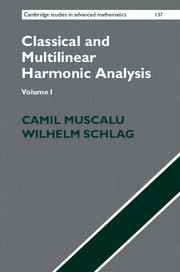Book contents
- Frontmatter
- Contents
- Preface
- Acknowledgements
- 1 Fourier series: convergence and summability
- 2 Harmonic functions; Poisson kernel
- 3 Conjugate harmonic functions; Hilbert transform
- 4 The Fourier transform on ℝd and on LCA groups
- 5 Introduction to probability theory
- 6 Fourier series and randomness
- 7 Calderón–Zygmund theory of singular integrals
- 8 Littlewood–Paley theory
- 9 Almost orthogonality
- 10 The uncertainty principle
- 11 Fourier restriction and applications
- 12 Introduction to the Weyl calculus
- References
- Index
6 - Fourier series and randomness
Published online by Cambridge University Press: 05 February 2013
- Frontmatter
- Contents
- Preface
- Acknowledgements
- 1 Fourier series: convergence and summability
- 2 Harmonic functions; Poisson kernel
- 3 Conjugate harmonic functions; Hilbert transform
- 4 The Fourier transform on ℝd and on LCA groups
- 5 Introduction to probability theory
- 6 Fourier series and randomness
- 7 Calderón–Zygmund theory of singular integrals
- 8 Littlewood–Paley theory
- 9 Almost orthogonality
- 10 The uncertainty principle
- 11 Fourier restriction and applications
- 12 Introduction to the Weyl calculus
- References
- Index
Summary
In this chapter we apply some probabilistic tools developed in Chapter 5 to Fourier series. Our main goal here is to be able to answer, using probabilistic arguments, questions which in and of themselves are deterministic. For example, in the following section we address the problem of a.e. convergence of the partial sums of the Fourier series of L1(T) functions. By means of a combination of deterministic and probabilistic ideas we shall show that L1 functions exist for which the partial sums of their Fourier series diverge almost everywhere. Section 6.2 is more probabilistic from the start, as it deals with the problem of deciding the convergence of Fourier series with random and independent coefficients. This is a classic topic, going back to the work of Paley and Zygmund in the 1930s; they introduced randomness into Fourier series as a tool for answering deterministic questions.
Fourier series on L1(T): pointwise questions
This section is devoted to the question of the almost everywhere convergence of Fourier series for L1(T) functions. From the previous chapters we know that this is not an elementary question, since the partial sums SN are given by convolutions, with the Dirichlet kernels DN, which do not form an approximate identity. Note also that we have already encountered an a.e. convergence question that is not associated with an approximate identity, namely, that for the Hilbert transform; see Proposition 3.18.
- Type
- Chapter
- Information
- Classical and Multilinear Harmonic Analysis , pp. 136 - 165Publisher: Cambridge University PressPrint publication year: 2013



